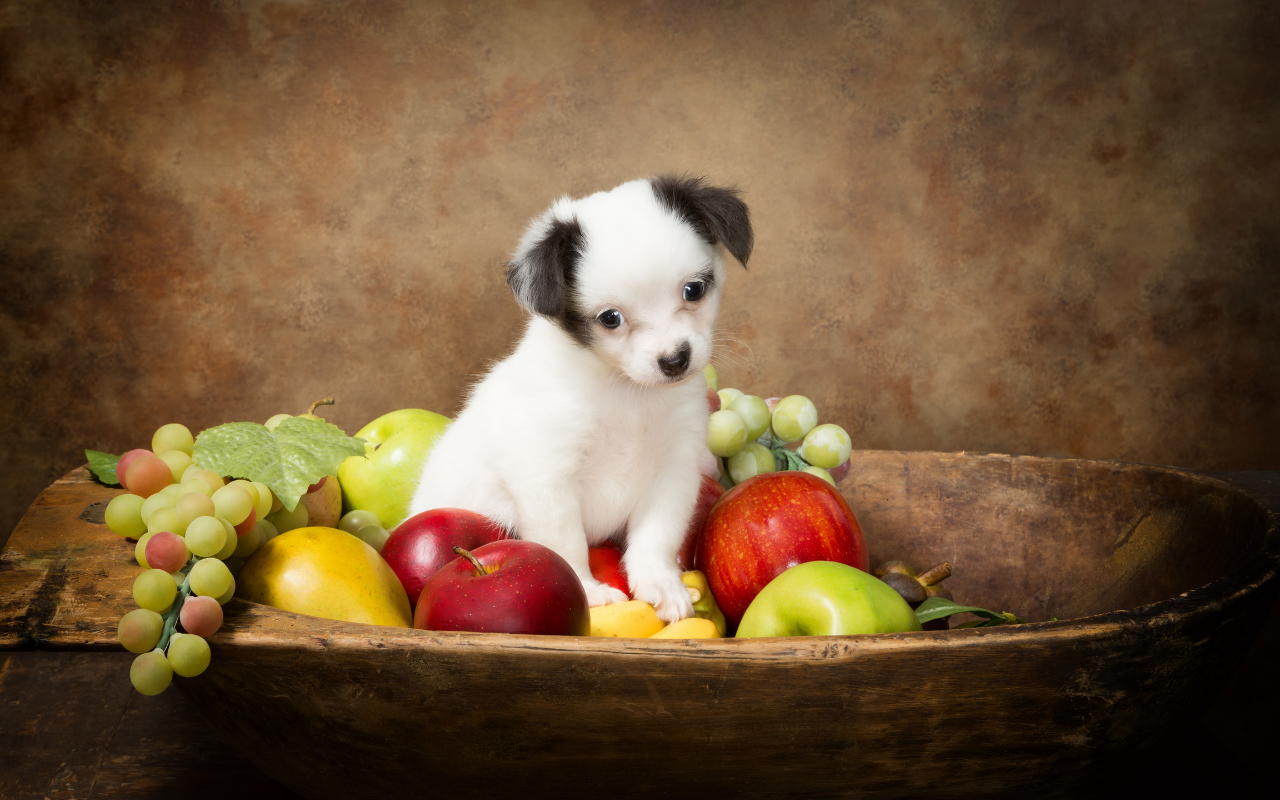Can Dogs Eat Grapes?
Can Dogs Eat Grapes? Why This Seemingly Innocent Fruit Could Be Deadly For Your Dog

Dogs are more than just pets — they’re loyal companions and treasured members of our families.
Naturally, we love to share our lives (and sometimes our snacks) with them. But while it’s heartwarming to give your dog a taste of what’s on your plate, not all human foods are safe for canine consumption.
When it comes to fruits, many are perfectly healthy and even beneficial for dogs, like blueberries, watermelon, or apple slices (without seeds). However, there’s one fruit that’s surprisingly dangerous — grapes.
So, are grapes safe for dogs to eat?
The answer is a clear, resounding
no.
In fact, grapes (and their dried counterpart, raisins) are among the most dangerous foods your dog can eat, no matter the quantity. Whether they’re red, green, seedless, or peeled — it makes absolutely no difference.
Grapes are toxic to dogs and can lead to devastating, even fatal, health consequences.
Why Can’t Dogs Eat Grapes?
You might be wondering:
How can something so healthy for humans be so harmful to dogs?
Grapes and raisins contain a mysterious substance that is highly toxic to dogs. Despite extensive research, veterinarians and scientists have yet to pinpoint exactly what in grapes causes toxicity. What they do know is this: ingestion of even small amounts can cause sudden kidney failure in dogs.
This means your dog’s kidneys could stop functioning properly, leading to a rapid buildup of waste products in the body — a life-threatening emergency.
What makes grape toxicity especially alarming is that it does not seem to depend on the dog’s breed, age, or size. Some dogs have eaten just a single grape and gone into kidney failure, while others have eaten several with minimal impact.
There is no way to predict how your dog might react, which is why zero grapes is the only safe amount.
The Risks of Feeding Dogs Human Food
Part of being a responsible dog owner is understanding that dogs process food very differently from humans. Their digestive systems, enzymes, and tolerances are unique to their species.
That’s why foods that are harmless or even healthy for us can be poisonous to them. Grapes are just one of many human foods that fall into this category, alongside chocolate, onions, garlic, xylitol (a sugar substitute found in gum and some peanut butters), and more.
Dogs are opportunistic eaters by nature. They see you enjoying a snack, it smells delicious, so naturally — they want in on the fun. This is why it’s so important to keep dangerous foods out of reach.
Many people keep a bowl of grapes on the kitchen counter or dining table, not realizing that a curious dog could easily help themselves.
How Do Grapes Affect Dogs?
When a dog consumes grapes or raisins, the consequences can be swift and severe. The toxic substance in these fruits attacks the kidneys, leading to acute kidney injury (AKI). Without immediate intervention, this can progress to complete kidney failure.
Kidneys perform the vital job of filtering waste products from the blood and balancing fluids and electrolytes.
When they suddenly stop working, toxins build up rapidly in the body, which can be fatal.
Signs and Symptoms of Grape Toxicity in Dogs
Because time is critical, knowing the signs of grape poisoning could save your dog’s life.
Symptoms can appear within a few hours of ingestion, although in some cases they might take up to 24 hours to become obvious.
Here are common symptoms of grape (or raisin) toxicity:
- Vomiting and/or diarrhea (often within the first few hours)
- Loss of appetite
- Lethargy or unusual weakness
- Tenderness or pain in the abdomen
- Dehydration (signs include dry nose/gums and sunken eyes)
- Excessive thirst and increased urination (early sign as the kidneys start to fail)
- Little or no urination (as kidney failure progresses)
- Bad breath (uremia smell) due to toxin buildup
- In advanced cases, seizures or tremors
If you notice any of these signs and suspect your dog has eaten grapes or raisins, do not wait. Call your vet immediately.
The sooner your dog gets treatment, the better the chances of a full recovery.
What Should You Do If Your Dog Eats Grapes or Raisins?
If you see or suspect your dog has eaten grapes or raisins — whether it’s a single grape that dropped on the floor or a handful snatched from the counter — treat it as an emergency.
Here’s what you should do:
- Call your veterinarian right away.
Don’t wait to see if symptoms develop. Grapes are so unpredictable that waiting could cost precious time. Describe how many grapes (or raisins) your dog may have eaten and when. - Call an emergency animal poison hotline.
In Australia, you can call the Animal Poisons Helpline on 1300 869 738 for free advice. - Follow veterinary guidance carefully.
Your vet may instruct you to induce vomiting at home, but only if it’s safe to do so. Never try to make your dog vomit without veterinary instructions — especially if your dog is struggling to breathe, showing signs of shock, or is very lethargic. - Bring your dog to the clinic.
If needed, your vet may induce vomiting, administer activated charcoal to bind toxins, provide intravenous fluids to support the kidneys, and closely monitor blood work.
The key with grape or raisin toxicity is rapid intervention.
Dogs treated within a few hours of ingestion typically have much better outcomes than dogs whose treatment is delayed.
Why Don’t We Know What Makes Grapes Toxic?
This is one of veterinary medicine’s enduring mysteries. Unlike chocolate (which contains theobromine and caffeine), or onions and garlic (which damage red blood cells), the specific toxin in grapes has not yet been identified.
Some theories have pointed to pesticides or fungal contaminants on the grape skins, but these were largely disproved, as organic grapes and peeled grapes are equally dangerous. Others suggest it may be a combination of compounds that are uniquely metabolised in dogs.
The bottom line is — until researchers pinpoint the exact cause, grapes remain a dangerous enigma.
What About Grape Products Like Juice, Jelly, or Wine?
This is another important point. Any product made from grapes is risky.
This includes:
- Raisins (which are dried grapes, and often even more concentrated)
- Currants (sometimes confusingly labeled, but often small raisins)
- Grape juice
- Grape jelly or jam
- Baked goods containing raisins, like muffins or fruitcakes
- Wine (of course also containing alcohol, which is toxic itself)
Even small crumbs from a raisin muffin can potentially cause a reaction in a sensitive dog.
Safer Fruit Alternatives for Dogs
It’s understandable to want to share treats with your furry friend. Fortunately, there are plenty of fruits that are perfectly safe for dogs to enjoy in moderation.
Try these instead:
✅
Apples (remove seeds and core)
✅
Blueberries (packed with antioxidants)
✅
Bananas (a sweet treat, but high in sugar so use sparingly)
✅
Watermelon (seedless and rind removed)
✅
Strawberries
✅
Pineapple pieces
✅
Pears (core and seeds removed)
Always introduce new fruits slowly to see how your dog’s stomach handles them. And remember, treats (even healthy ones) should make up no more than 10% of your dog’s daily calories.
How to Keep Your Dog Safe from Grapes
Here are practical tips to protect your dog:
- Store grapes and raisins out of reach.
Keep fruit bowls off low tables and store raisins and baked goods securely in closed cupboards. - Educate the whole household.
Make sure children and visitors know not to feed your dog grapes, raisins, or foods that contain them. - Clean up promptly.
If grapes fall on the floor, pick them up immediately so your dog doesn’t snatch them. - Be careful on walks.
Sometimes discarded snacks, lunchboxes, or bakery items are left on sidewalks. Keep an eye on what your dog sniffs or tries to eat outside. - Read ingredient labels.
Some muesli bars, cereals, breads, or biscuits contain hidden raisins or currents.
The Bottom Line: Grapes Are Never Safe for Dogs
Grapes and raisins are deceptively innocent looking. For humans, they’re a nutritious snack loaded with vitamins and antioxidants. For dogs, they’re a silent threat that can lead to acute kidney failure and, tragically, death.
Because there’s no way to know how your dog might react, and because the toxic substance is still unidentified, the safest policy is total avoidance.
If you ever catch your dog eating grapes or raisins — act fast. Prompt veterinary care can save their life.
In Summary
- 🚫 Can dogs eat grapes? Absolutely not.
- 💧 Just one grape can cause serious harm — there is no “safe amount.”
- ⚠ Watch for symptoms like vomiting, diarrhea, lethargy, and abdominal pain.
- 🐾 If your dog eats grapes or raisins, contact your vet immediately.
- ✅ Opt for dog-friendly fruits like apples, blueberries, and watermelon instead.
Keeping your dog safe is all about knowledge and prevention.
By understanding the dangers of grapes and raisins — and spreading the word to other dog owners — you’re helping keep pets everywhere happier and healthier for years to come.




